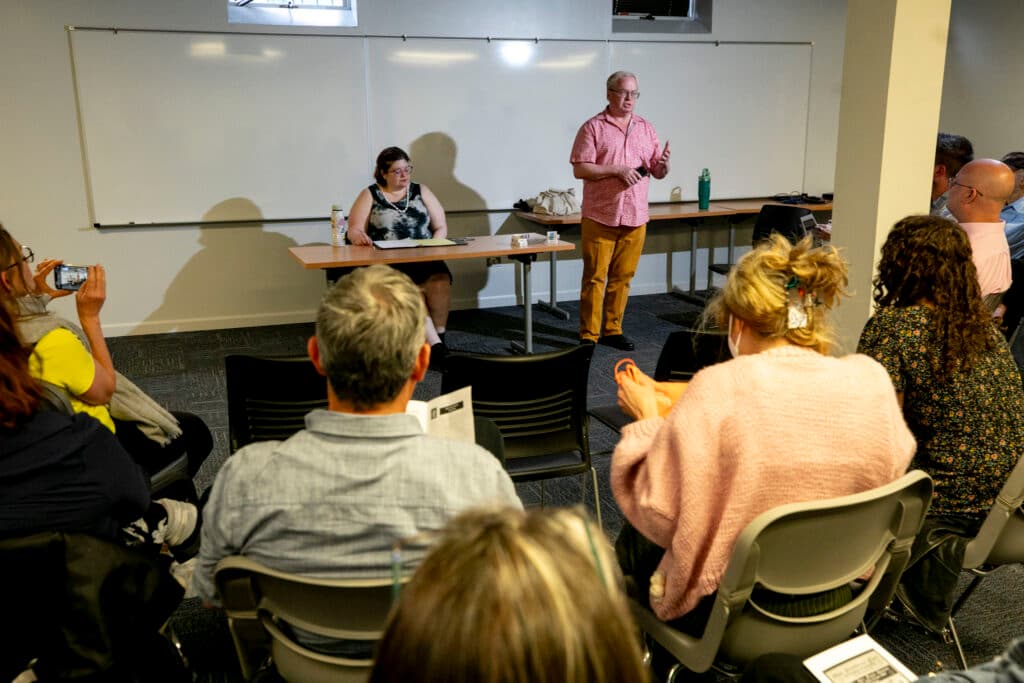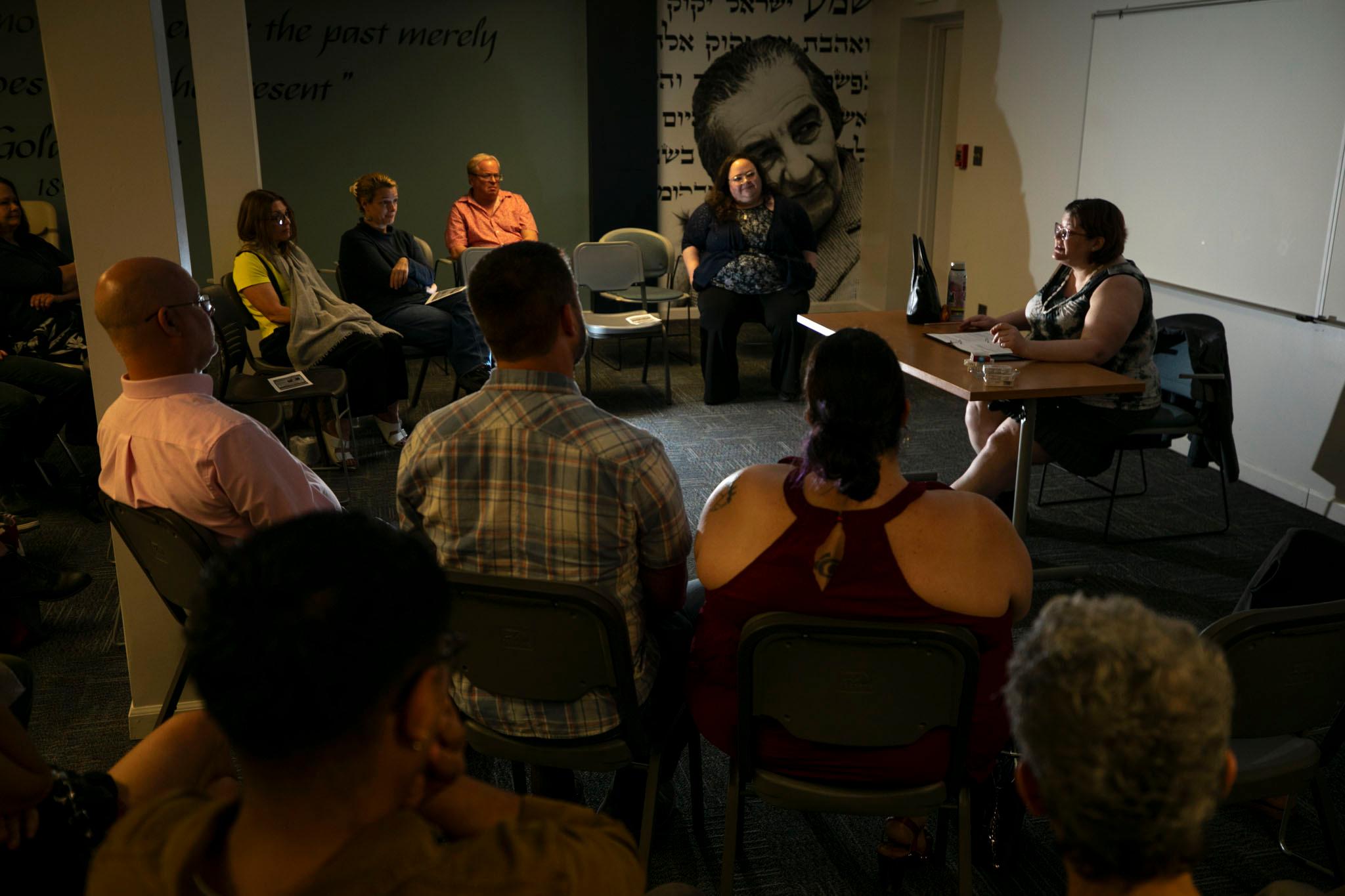Six boxes of candy cigarettes and a crystal ashtray rest on the corner of a table center "stage," facing an audience of 22 people sitting semi-circle in the basement of Auraria’s Golda Meir House Museum.
Selena Naumoff is reading from a new play about the life and legacy of the former Israeli Prime Minister, who spent some of her early formative years in Denver.
“Pretend that Golda is smoking the whole time,” Naumoff prefaced. “Because she is.”

Seated to her right is playwright Mike Broemmel. Neatly combed white hair and a pair of rectangle-framed eyeglasses only partially obscure the wrinkle between his eyebrows as he keenly listens to Naumoff recite the lines of his latest play: "When Strawberries Bloom: The Creation of Golda Meir."
The play is slated to premiere at the Denver Performing Arts Complex Studio Loft on Oct. 5 and 6.
The play began development as the Israel-Hamas war started, and continued as protests happened nearby
Broemmel was asked to write the script by a production company in the early morning hours of Oct. 7, 2023, before any knowledge of what had transpired an ocean away.
“I hope I am conveying it faithfully,” Broemmel said. “Even on this campus, I felt the play needed to weave in contemporary thoughts and contexts.”

In April, students set up an encampment at Auraria Campus to protest Israel’s war in Gaza. The demonstration carried on for more than three weeks, outlasting police sweeps, snowstorms and citations during the week of finals and graduation. Antiwar protesters ended their encampment on May 18.
The Golda House is located just a one-minute walk from Tivoli Quad where the main encampment was formed. Near the end of the protest, some demonstrators scattered campus-wide and set up just outside the house.
“It made it hard to conduct the business of the museum,” said Lena Fishman, executive director of the museum. “It was scary. It was sad.”

Fishman was hired almost three years ago to help revitalize the museum, bringing greater awareness and turning it into, “a place where visitors can learn about an important piece of Denver history.”
Fishman says the protests created an environment of antisemitism on campus.
“It’s hard to face hate on a daily basis when you come into work,” Fishman said. “In this museum, we always use Golda as our inspiration. The goal of the museum is education. We stick to our mission.”
When Denverite asked Auraria about incidences of antisemitism at the Golda Meir House, a spokesperson said the museum experienced minor vandalism, but did not connect the acts to protesters.
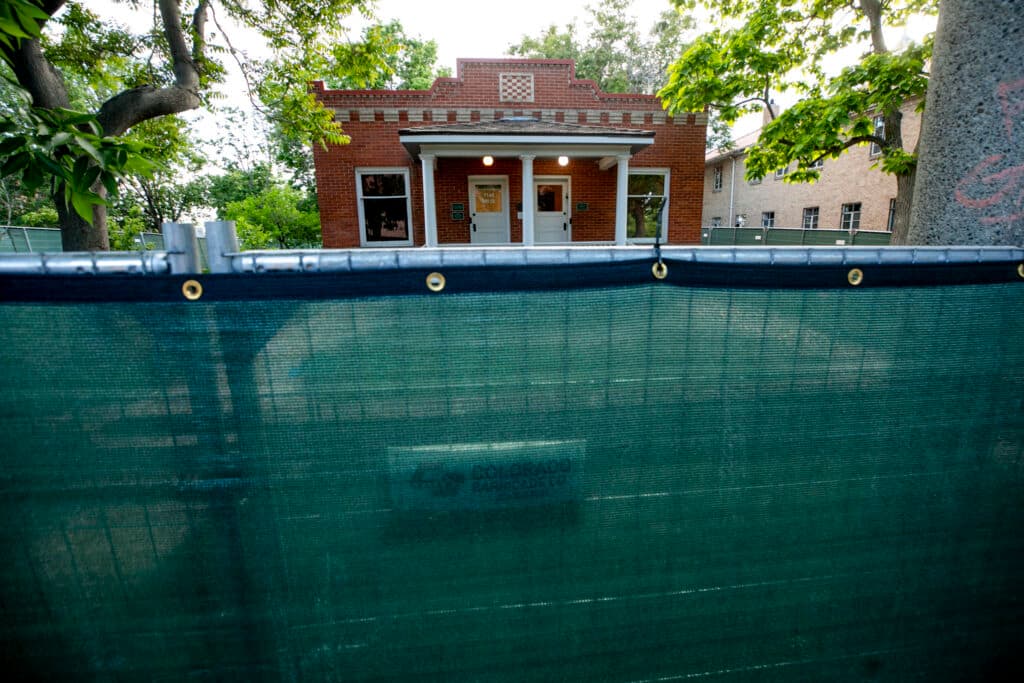
“Since October of 2023, several protests have centered around the Golda Meir House,” said Devra Ashby, an Auraria Higher Education Center spokesperson. “There have also been two incidents of minor vandalism with chalked antisemitic verbiage on the Golda House and surrounding concrete.”
Auraria Campus Police Department (ACPD) was called to respond to the Golda House on 30 separate days for various reasons, mostly to check the premises, Ashby said.
ACPD decided to erect a green security fence around the museum’s perimeter and ensure a constant patrol of the area.
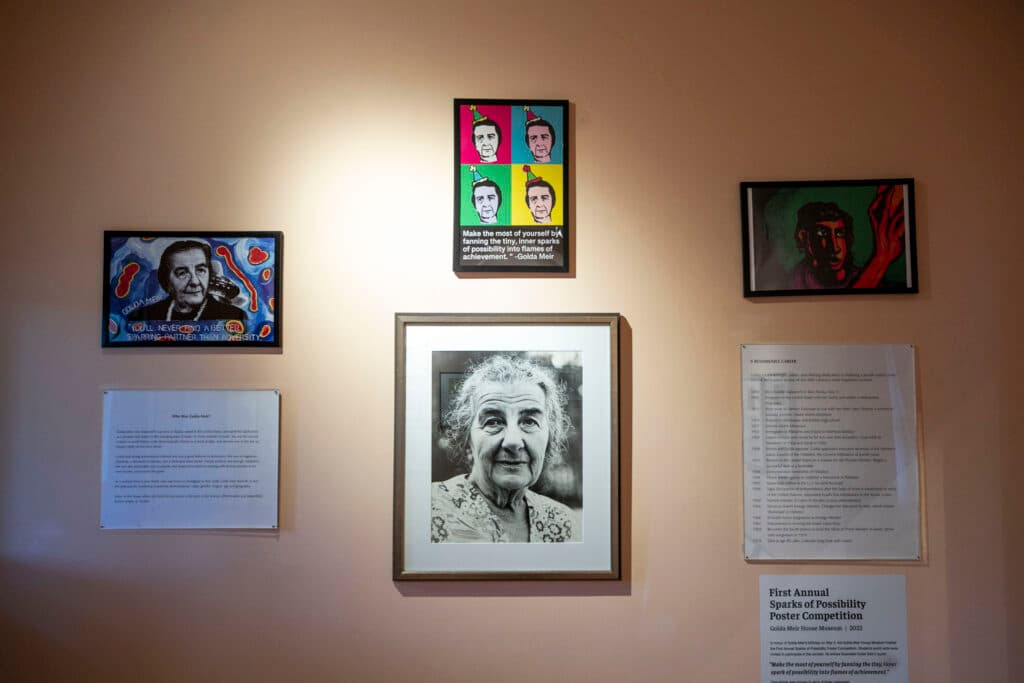
A quick biography of Golda Meir
Meir was born in 1898 in Ukraine, at a time when the country was under Russian control and when Jews were massacred by violent mobs in pogroms, anti-Jewish riots.
Her family immigrated to the U.S. in 1906. She ran away from home in 1913 at age 14 because her parents would not let her continue her education. Meir moved to Denver to live with her older sister and brother-in-law.
She credited Denver with being the place where her real education began, in the company of the many intellectual immigrants who gathered in their home kitchen.
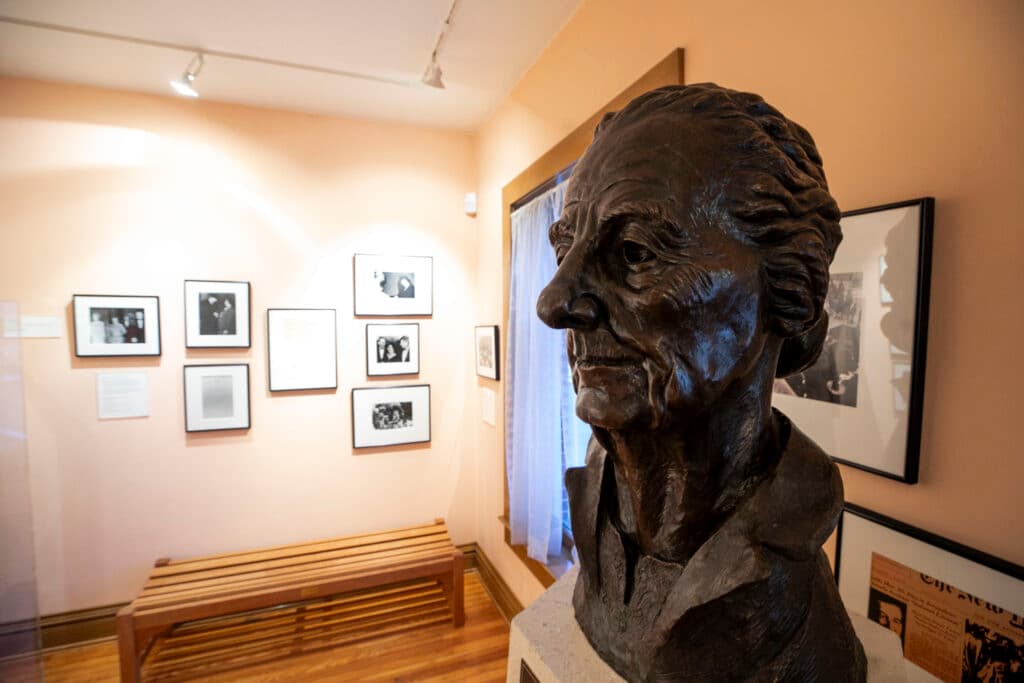
She developed ideas about women’s and workers’ rights, became a socialist, and got deeply involved in Zionism — a Jewish nationalist movement then working to create what is now the State of Israel.
“Golda is here at the moment when those discussions are happening,” Fishman said.
Her work enacting social welfare policies in office has been celebrated. Meir has also been heavily criticized for her handling of the Yom Kippur War, her rejection of the notion of Palestinian identity and other controversies.
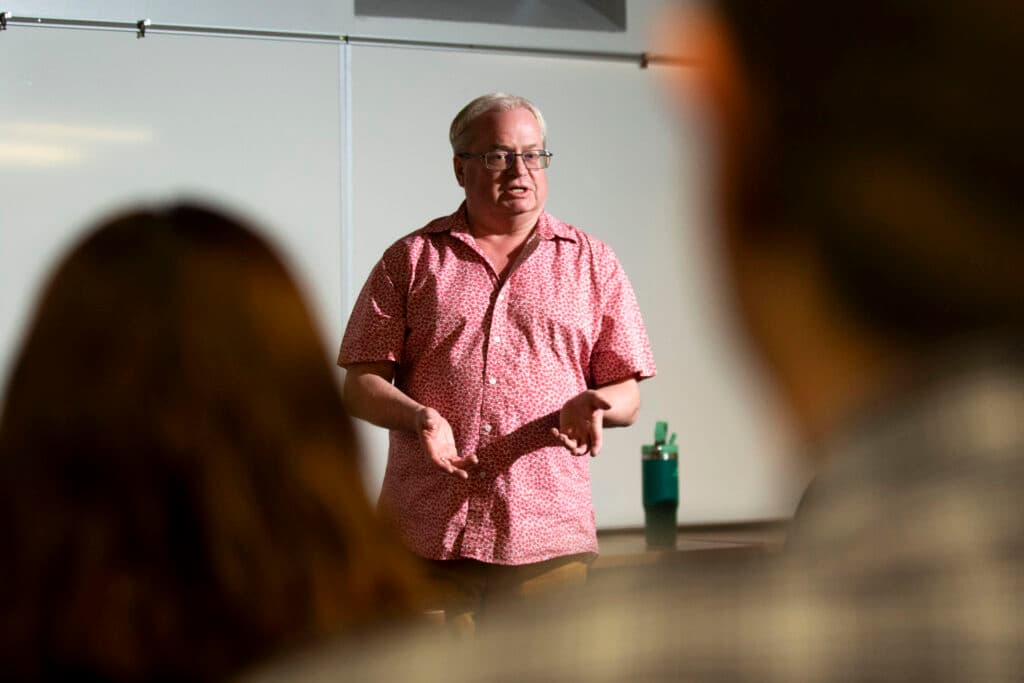
Capturing the complicated legacy of Israel’s first female Prime Minister
Broemmel is known for his one-actor plays on historical figures like Hedy Lamarr, Truman Capote, Virginia Hill, Helen Bonfils and Harvey Milk (the latter being a show that ran Off-Broadway in 2023).
“I tend to be most interested in historical figures whose history has been maligned or not fully told,” Broemmel said.
Broemmel does not watch films or other renditions of his subjects so as to avoid "mimicking" someone else’s interpretation of the character. Instead, he reads books and, speeches, and, in this case, spends time in the Golda House.
“I don’t want to sound like an academic,” Broemmel said. “I’m a storyteller. I approach this by telling a story about Golda Meir.”
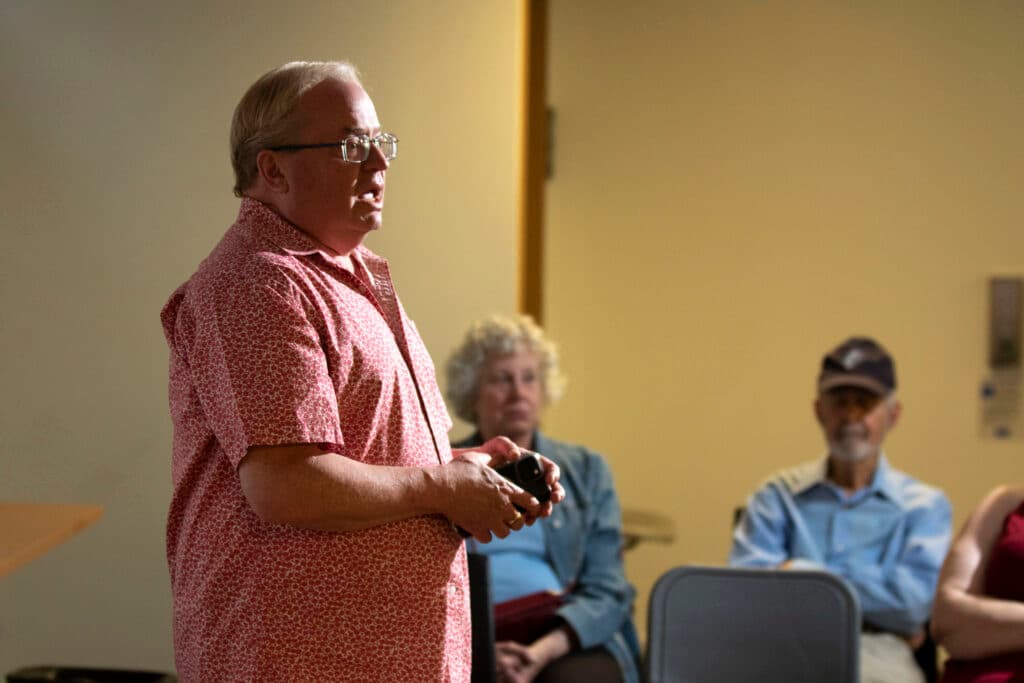
In preparation for this production, Broemmel turned to the relics inside of the Golda Meir House Museum. The brick duplex was once located in Denver’s west side and saw a teenage Golda Meir attend and graduate from North High School.
For Broemmel, capturing some of Meir’s most difficult moments — like her experience observing political leaders at the 1938 Evian Conference fail to reach an agreement accommodating Jewish refugees fleeing violent oppression — was crucial to understanding Meir's creation story.
“She was very funny,” Broemmel said. “Wit, courage and strength of character allowed her to do things that we’re not seeing with the current prime minister of Israel.”
The arts as a space for dialogue
Fishman hopes that hosting a reading of Broemmel’s play will help do what the museum intends to do: inspire difficult dialogues under the pressures of Israel's attacks on Gaza.
“What’s occurring in the Middle East, around the world and on this campus, those are complex issues,” Fishman said. “The arts are a space where we can safely do these types of dialogues.”
As Broemmel delivered his closing remarks and thanks to the audience for attending the first stage reading of his play, his words were backdropped by a mural of Golda Meir and a quote:
“One cannot and must not try to erase the past merely because it does not fit the present.”
